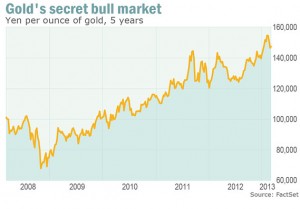You won’t hear about it in the usual places. Everywhere you turn these days, all you hear is that gold is down, it’s finished, it’s heading for something called a “death cross,” which sounds terrifying. But away from the headlines, gold just rocketed to a new, all-time high.
Where? In Japan — the world’s fourth largest economy.
The arrival of a new government in December, and the launch of Japan’s own brand of “quantitative easing,” or money printing, has sent the yen tumbling dramatically on the international exchanges. Lots more yen means each yen is worth less.
An ounce of gold, which sold for 125,000 yen as recently as last July, now sells for 145,000. It touched 155,000, an all-time record, early in February.
Those Japanese who dumped their yen in the past couple of years and stocked up on gold are probably feeling pretty good at this point.
Gold has rocketed up 36% in yen in two years. So much for the collapse in gold.
And this isn’t an isolated case. In recent months, gold also hit new highs in other countries, including Brazil, Iceland and India.

Look at Argentina. I’ll leave it to others to comment on the presidency of Cristina Fernandez de Kirchner. As I’m in the news business, allow me to be candid and say that at least she is entertaining and ensures that those of us who scribble for a living won’t run short of things to write about.
Any Argentines who dumped their pesos when she first became president, in 2007, and loaded up on bullion instead are probably very, very relieved. Gold has more than tripled since then, when measured in pesos. It is up 45% just in the past two years, recently hitting record highs.
It is looking pretty healthy to a lot of people in London about now, too. The British pound has been slumping after economic data came in worse than expected. The traditional response is, “Oh, that’s just because their currencies are down.” Er, yes. That’s like saying demand for umbrellas has only gone up because it’s raining.
Japan is deliberately driving down its currency to boost its economy.
This is a zero-sum game: It can only work by boosting your economy versus other countries, whose currencies thereby become more expensive. At some point, they are apt to respond.
I’m gold-agnostic. I think it’s a ridiculous currency. I just accept that the others may well be worse. Gold is the only currency no country can just print incessantly in order to boost its economy.
(Incidentally, there are two other arguments in favor of gold. The first is that the Chinese Central Bank is surely going to increase its holdings. It makes no sense for the Chinese to hold their reserves in dollars and euros, two assets that their chief rivals can devalue at will. The second is that gold is now the only financial asset that still accords privacy. Everything else is being monitored.)
I have to say I am somewhat baffled by the latest outpouring of bullishness and unfettered optimism. Things were never as bad as they seemed at the bottom, but they are hardy A-OK now. The entire economic recovery has been built on the back of record federal budget deficits and record money printing by the Federal Reserve.
This is financial engineering.
The latest sequestration fiasco shows that the only institution left which can actually govern is the Fed. It’s all down to Fed chief Ben Bernanke. And if deficits come down, there is every reason to suspect he may have to keep printing.
We do not have much inflation at the moment, except in financial assets. But it would be a brave person who could say confidently that we won’t get any down the road.
Gold, famously, is a hedge against inflation. This is why some very sensible people suggest you should always have a few percent of your portfolio in gold, as insurance.
As the Japanese — and Argentines — could tell you.









